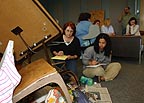August 18, 2006
Course trains social workers to help in disasters
CARBONDALE, Ill. -- When disaster strikes, Hussein Soliman wants to be sure that the helping professions actually help.
"Disasters create a lot of needs," said Soliman, a professor in the School of Social Work, part of Southern Illinois University Carbondale’s College of Education and Human Services.
"A crisis may unite people, but they still need help to move beyond it, to deal with the sense of loss, fear, helplessness and hopelessness."
Soliman has created a graduate-level course to train social workers to help individuals, families and communities cope with the particular stresses that disasters can cause.
"When people hear about disasters, they want to rush over and carry stuff," Soliman said.
"With this kind of training, we could do more than just move furniture."
Soliman taught this new course for the first time this past May. Designed as an intensive, weeklong, immersion experience, it drew 10 women and two men ranging in ages from their late 20s to their late 40s.
The students learned about the nuts and bolts of disaster relief work — shelter operations, first aid, family and mental health services and the like.
But they also looked at the larger picture: how cultural characteristics affect individuals, families and communities during a disaster and how awareness of these characteristics can help workers make assessment and conduct interviews with more sensitivity.
They studied the factors that affect emotional resilience and fragility; the ways in which bias about social and economic class can influence policy development and service delivery; and how social workers can instill hope and build on strengths so that people have the skills they need to solve their own problems when the social workers and other helpers depart.
In addition, the course involved case studies, which included the sorts of crises people associate with the word "disaster," such as a hurricane or a school shooting. But students also took a look at less obvious crises, such as the upcoming demise of the Maytag plant in neighboring Herrin, just a few miles down the road from campus.
"People come together in most disasters, but when a factory leaves, you end up with people moving out," Soliman said.
"Land values go down, tax revenues disappear, services can’t be offered. A community is like a family — it can suffer."
Leatha D. Holder of Carterville, a former social worker at Four Rivers Behavioral Health in Paducah, Ky., who has enrolled in SIUC’s graduate program, said the things she learned were right on target in preparing her to deal with today’s world.
"At Four Rivers, I worked with some of the victims of Hurricane Katrina, and I wasn’t equipped," she said.
"When you can understand and empathize with what someone is going through, you can better serve them."
Jacqueline "Jacki" K. Jackson of Carbondale, a new graduate student who just finished her bachelor’s in social work at SIUC this spring, said she signed up for the course because it covered material rarely taught in regular classes.
"We talk about disasters happening but not what we would do or how that would work," she said.
"I learned a lot about traumatic events and how we could enter those situations. It’s obvious to me now that social workers should be there — it wasn’t before."
Soliman said he thought the class had been well received.
"The last day they gave me a standing ovation," Soliman said with a smile.
"I said, ‘Wait a minute, guys — I haven’t given you your grades yet!’"
Engaging students in broad learning opportunities is among the goals of Southern at 150: Building Excellence Through Commitment, the blueprint the University is following as it approaches its 150th anniversary in 2019.
(Caption: Training for disaster — As (foreground from left) Ann Lind and Gina M. Serrao record their observations of a mock disaster, Southern Illinois University Carbondale social work professor Hussein Soliman (standing) sets the scene for graduate students (from left) Janelle L. Biver, Jacqueline K. Jackson, D. Ronell Smith and Rindi M. Reeves, who will play the roles of social workers attempting to help factory workers deal with the closing of the Maytag plant in nearby Herrin.
The six women were among 12 students enrolled in an intensive, weeklong class offered for the first time this summer and designed to train social workers in helping individuals, families and communities cope with the stress disasters can cause.
Lind lives in Johnston City, Serrao is from Pittsburgh, Pa., Biver lives in Pittsburg, Ill. (16451 Pittsburg Road), Jackson is from Leroy (303 E. Wayne), Smith’s family hails from Cave-In-Rock (R.R. 1) and Reeves is a native of Marion (12217 Route 166).)
Photo by Jeff Garner

